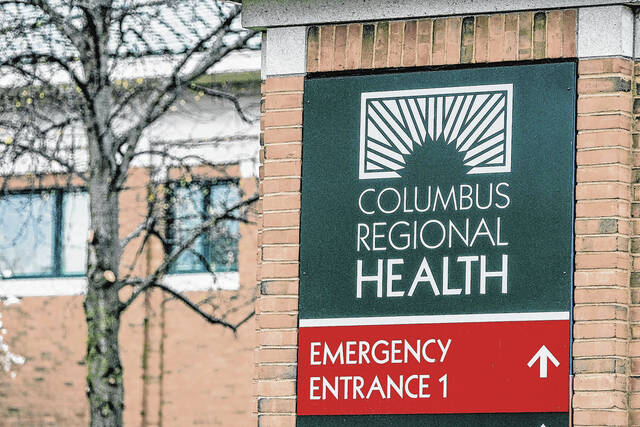
Republic file photo An exterior view of Columbus Regional Hospital’s sign directing patients to the emergency entrance.
Columbus Regional Hospital continues to cope with a surge in hospitalizations — with dozens of COVID-19 patients filling beds — while an increasing number of staff missing work due to testing positive for coronavirus adds to the strain.
There were 51 people hospitalized with COVID-19 at CRH on Monday, up from 45 the day before, the hospital said. Four coronavirus patients were listed in critical condition Monday morning.
The total hospital census was running in the “mid- to high-170s” on Monday, which is down from the record 198 seen last week but still considerably higher than what the hospital would generally see this time of year before the pandemic.
By comparison, 100 to 120 hospitalizations on the same day would have been considered “very busy” in previous years, hospital officials said.
The hospital’s staffed occupancy rate was hovering around 90% to 95% on Monday, CRH officials said.
“Things are still incredibly tight,” said CRH spokeswoman Kelsey DeClue. “Surge protocols (are) still in place.”
“Just as we’re seeing in community spread, we’ve had recent increases in staff positives and illness,” DeClue added.
The update comes as CRH continues to be at its most overwhelmed point of the pandemic so far as officials struggle to handle a flood of patients amid the worst coronavirus wave in a year.
Several times over the past month, CRH has set new all-time inpatient census records, reaching 198 on at least two occasions — the most ever in the hospital’s 104-year history.
Hospital officials have warned that the crush of patients has been placing in jeopardy the space and resources needed for patients with unavoidable medical emergencies or accidents.
COVID-19 patients have generally accounted for one-fourth to one-third of CRH’s total hospitalizations as of late, “placing serious strain on vital resources, such as space, equipment and staffing,” the hospital said. About 80% of coronavirus patients at CRH — 4 out of 5 — are unvaccinated.
“The space and crucial resources needed for victims of unavoidable medical emergencies or accidents is in jeopardy, being consumed, in-part, by people being hospitalized by a largely avoidable and preventable disease — COVID-19,” the hospital said in a recent statement.
However, the situation at CRH mirrors trends seen across the state and much of the country. Last week, the number of Hoosiers hospitalized with COVID-19 has reached its highest level in a year, and the overall hospital census in Indiana was at its highest level in five years, officials said.
“We once again are facing a very bleak situation with this pandemic,” Indiana State Health Commissioner Dr. Kristina Box told reporters in a recent news conference. “…This situation will get worse before it improves.”
Nationwide, new COVID-19 cases per day have more than tripled over the past two weeks, reaching a record-shattering average of 480,000 per day, The Associated Press reported. Schools, hospitals and airlines are struggling as infected workers go into isolation.
Meanwhile, U.S. hospital admissions averaged 12,700 per day last week, up 46% from the previous week, but well short of the peak of 16,500 per day a year ago, when the vast majority of the U.S. was unvaccinated, according to wire reports. Deaths have been stable over the past two weeks at an average of about 1,200 per day, well below the all-time high of 3,400 last January.
Public health experts suspect that those numbers, taken together, reflect the vaccine’s continued effectiveness at preventing serious illness, even against omicron, as well as the possibility that the variant does not make most people as sick as earlier versions, according to the AP
Omicron accounted for 95% of new coronavirus infections in the U.S. last week, the Centers for Disease Control and Prevention reported Tuesday, in another indication of how astonishingly fast the variant has spread since it was first detected in South Africa in late November.
State and local health officials are urging people to get vaccinated against COVID-19 and get their booster shot when they become eligible.
The Associated Press contributed to this report.




